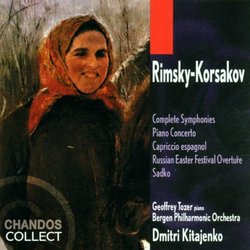| All Artists: Nikolai Rimsky-Korsakov, Dmitri Kitajenko, Bergen Philharmonic Orchestra Title: Rimsky-Korsakov: Complete Symphonies; Piano Concerto; Capriccio Espagnol; etc. Members Wishing: 0 Total Copies: 0 Label: Chandos Release Date: 9/26/2000 Genre: Classical Styles: Forms & Genres, Concertos, Theatrical, Incidental & Program Music, Historical Periods, Romantic (c.1820-1910), Instruments, Keyboard, Symphonies Number of Discs: 2 SwapaCD Credits: 2 UPC: 095115661321 |
Search - Nikolai Rimsky-Korsakov, Dmitri Kitajenko, Bergen Philharmonic Orchestra :: Rimsky-Korsakov: Complete Symphonies; Piano Concerto; Capriccio Espagnol; etc.
 | Nikolai Rimsky-Korsakov, Dmitri Kitajenko, Bergen Philharmonic Orchestra Rimsky-Korsakov: Complete Symphonies; Piano Concerto; Capriccio Espagnol; etc. Genre: Classical
|
Larger Image |
CD Details |
CD ReviewsReview of the music in a historical context L A Shields | Liverpool United Kingdom | 11/04/2000 (5 out of 5 stars) "Any fans of Rimsky-Korsakov, Russian or classical music will enjoy this CD. The works contained on the 2 disk CD, give a great overview to some of Rimsky-Korsakov's finest compositions. The one movement piano concerto is of particular interest, Rimsky-Korsakov could not play piano yet the concerto shows incredible understanding of the instrument and the form. In Rimsky-Korsakov's book "My Musical Life" he comments on a Lisztian influence when composing this piece. The three symphonies display ideals from the "The Mighty Handful"(Balakirev, Moussorgsky, Borodin, Cui and Rimksy-Korsakov) and a shift away from the German hegemony so apparent at the time. The Russian Easter Overture draws on light ecclesiastical references that combine with great orchestration. Sadko(a musical picture) is a tone poem and can also be linked to Liszt, in particular "Ce qu'on entend sur la montagne". Rimsky-Korsakov uses the harmonic and modulatory basis of Liszt's work to depict the "calm surging sea". Capriccio Espagnol displays some of the best orchestration ever written, in the piece Rimsky-Korsakov proves his ingenuity of the art. With this list of orchestral pieces The Bergen Philharmonic Orchestra do not deserve anything less than 5 stars" Extremely interesting music, but the performances leave a li G.D. | Norway | 02/27/2009 (3 out of 5 stars) "The quality of Rimsky-Korsakov's symphonies is the object of some disagreement, in particular with regards to the most famous of them, the second. I belong to those who view it as an utterly remarkable work, a truly original and compelling piece that doesn't really sound like anything else. The composer later re-published it as a symphonic suite, and although many seem to think that this categorization is more accurate, I myself find that it actually works quite well as a genuine symphony - but no matter; it is really a marvelous and memorable work. It is also far superior to the other two; no. 1 is very early and was revised several times over; it is a colorful work that the composer obviously struggled to make structurally coherent. Much the same is the case with no. 3, which contains a fine slow movement and a delightful 5/4 scherzo, but which doesn't overall leave a very lasting impression.
Kitajenko takes a bold and resolute approach. But in the end the performances aren't really a match for Järvi and the Gothenburg players - Rimsky-Korsakov was a master of orchestral colors, and these works need players who can realize these, and in that respect the rather coarse-grained and somewhat lifeless playing of the Bergen Philharmonic doesn't stand up to the lushness and textural atmospheres conjured up by Järvi and the Gothenburgers. The same goes, in general, for the fillers. The famous Russian Easter Ouverture sounds a little gritty and lackluster, rather than ideally buoyant, colorful and ferocious. The performances aren't bad, but there are better versions available. Capriccio Espagnol fares better, but here the competition is even fiercer. The Sadko overture is, however, very fine, with lots of color and atmosphere (I do, by the way, urge readers to consider obtaining the whole fantasy fairy-tale opera). The piano concerto is far from a masterpiece, despite some decent tunes. Tozer plays it finely, but one could in the wish for some more flashy brilliance in the playing (Tozer seems to take it a little more seriously than its slight structure can bear). All in all, this is a worthwhile set, but all the music is available in superior performances, so I would proceed with some care (Rimsky-Korsakov, whose main strength lies in conjuring up magic with orchestral colors, is one those composers who really requires as good performances as possible). Sound quality is rich and full, however." |

 Track Listings (13) - Disc #1
Track Listings (13) - Disc #1